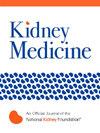Patient Activation, Social Support, Physician Trust, and Shared Dialysis Decision-Making: A Cross-Sectional Investigation
IF 3.4
Q1 UROLOGY & NEPHROLOGY
引用次数: 0
Abstract
Rationale & Objective
People undergoing maintenance dialysis often lack essential information about kidney therapy options. Therefore, nephrologists must involve patients and families in shared decision-making (SDM). In this investigation, we hypothesized that patient activation, social support, and physician trust would be associated with patient-reported SDM.
Study Design
A cross-sectional survey.
Methods
We surveyed hospitalized individuals receiving maintenance dialysis. Participants completed the 9-item SDM questionnaire (SDM-Q-9) and the Patient Activation Measure-13, the Multidimensional scale of perceived social support, and the Primary Care Assessment Survey Trust Subscale.
Analytic Approach
We used descriptive statistics to present demographics. We included patient demographics in multivariable linear regression models predicting SDM scores.
Results
Of the 223 respondents, 222 patients completed SDM-Q-9, 54% were ≥65 years old, with 47% being woman. In addition, 37% self-identified as African American, 48% had an education level at ≤high school, and 54% reported an annual household income of ≤$20,000. The SDM-Q-9 scores (n = 222) had a mean of 57.49 (SD = 27.07), median 58 (IQR = 38-82), and ranged from 0 to 100. The mean patient activation was 53.5 ± 16.5 (min 24, max 100), social support 61.2 ± 24 (min 0, max 100), and physician trust 59.29 ± 21.6 (min 0, max 100). In separate multivariable linear regression models, higher patient activation (1-point patient activation measure increase per 0.48-unit SDM increase; 95% CI, 0.24-0.73), higher social support (1-point increase per 0.28 SDM increase; 95% CI, 0.11-0.45), and greater physician trust (0.31-point increase per 1-point SDM increase; 95% CI, 0.12-0.49) were significantly associated with greater SDM.
Limitations
The study was a cross-sectional investigation.
Conclusions
Our findings indicate a significant association between SDM and patient activation, social support, and physician trust. Future research with individuals actively considering kidney therapy options should prospectively explore the relationship between patient activation, social support, physician trust and SDM.
Plain Language Summary
There is limited literature on the association between patient activation, social support, and physician trust with patient-reported shared dialysis decision-making. Therefore, we examined this association in a convenience sample of 222 people receiving maintenance dialysis. We found that patient activation, social support, and physician trust were independently associated with shared dialysis decision-making. Future prospective studies are needed to explore the relationship between patient activation, social support, physician trust, and shared dialysis decision-making among individuals actively considering kidney therapy options.
患者激活、社会支持、医生信任和共享透析决策:一项横断面调查
基本原理及目的接受维持性透析的患者往往缺乏有关肾脏治疗选择的基本信息。因此,肾病专家必须让患者和家属参与共同决策(SDM)。在本研究中,我们假设患者激活、社会支持和医生信任与患者报告的SDM相关。研究设计:横断面调查。方法对住院接受维持性透析的患者进行调查。参与者完成了9项SDM问卷(SDM- q -9)和患者激活量表-13、感知社会支持多维量表和初级保健评估调查信任子量表。分析方法我们使用描述性统计来呈现人口统计数据。我们将患者人口统计学纳入预测SDM评分的多变量线性回归模型。结果223名受访者中,222名患者完成SDM-Q-9, 54%年龄≥65岁,其中47%为女性。此外,37%的人认为自己是非洲裔美国人,48%的人受教育程度不超过高中,54%的人家庭年收入不超过2万美元。SDM-Q-9评分(n = 222)的平均值为57.49 (SD = 27.07),中位数为58 (IQR = 38 ~ 82),评分范围为0 ~ 100。平均患者激活为53.5±16.5(最小24,最大100),社会支持为61.2±24(最小0,最大100),医生信任为59.29±21.6(最小0,最大100)。在单独的多变量线性回归模型中,较高的患者激活(每增加0.48单位SDM, 1点患者激活测量增加;95% CI, 0.24-0.73),更高的社会支持(每增加0.28 SDM增加1点;95% CI, 0.11-0.45),以及更高的医生信任(SDM每增加1点,增加0.31点;95% CI, 0.12-0.49)与更高的SDM显著相关。本研究为横断面调查。结论SDM与患者激活、社会支持和医生信任之间存在显著相关性。未来对积极考虑肾脏治疗方案的个体的研究应前瞻性地探索患者激活、社会支持、医生信任和SDM之间的关系。关于患者激活、社会支持和医生信任与患者报告的共同透析决策之间关系的文献有限。因此,我们在222名接受维持性透析的患者中检查了这种关联。我们发现患者激活、社会支持和医生信任与共享透析决策独立相关。未来的前瞻性研究需要探索患者激活、社会支持、医生信任和积极考虑肾脏治疗选择的个体之间的共同透析决策之间的关系。
本文章由计算机程序翻译,如有差异,请以英文原文为准。
求助全文
约1分钟内获得全文
求助全文

 求助内容:
求助内容: 应助结果提醒方式:
应助结果提醒方式:


